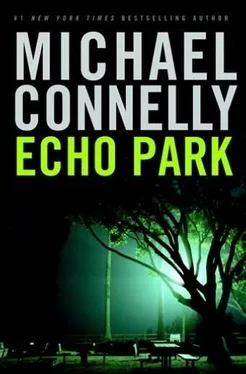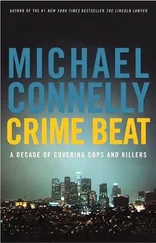They waited less than a minute. The clerk stepped back out through the door, followed by a man wearing a white, short-sleeved shirt and a maroon tie. He came directly to Rachel Walling.
“I’m Mr. Osborne. How can I help you?”
“We need to step into your office, sir. This is a highly confidential matter.”
“Over this way, please.”
He pointed to a swing door at the far end of the counter. Bosch and Walling walked down to it and its lock was buzzed open. They followed Osborne back through the rear door to his office. Rachel let him get a look at her credentials once he was seated behind a desk festooned with dusty Dodgers memorabilia. There was a wrapped sandwich from Subway front and center on his desk.
“What’s this all-”
“Mr. Osborne, I work for the Tactical Intelligence Unit here in Los Angeles. I’m sure you understand what that means. And this is Detective Harry Bosch of the LAPD. We’re working a joint investigation of high importance and urgency. We’ve learned from your clerk that there exists a file pertaining to an individual named Robert Foxworth, date of birth eleven/three/’seventy-one. It is vitally important that we be allowed to review that file immediately.”
Osborne nodded, but what he said didn’t go with a nod.
“I understand. But here at DCFS we work under very precise laws. State laws that protect the children. The records of our juvenile wards are not open to the public without court order. My hands are-”
“Sir, Robert Foxworth is no longer a juvenile. He is thirty-four years old. The file might contain information that will lead us to the containment of a very grave threat to this city. It will undoubtedly save lives.”
“I know, but you have to understand that we are not-”
“I do understand. I understand perfectly that if we don’t see that file now, we could be talking about a loss of human life. You don’t want that on your conscience, Mr. Osborne, and neither do we. That’s why we are on the same team. I’ll make a deal with you, sir. We will review the file right here in your office with you watching. In the meantime, I will get on the phone and instruct a member of my team at Tactical to draw up a search warrant. I will see to it that it is signed by a judge and furnished to you before the end of business today.”
“Well… I’d have to call it up from Archives.”
“Are the archives here in the building?”
“Yes, down below.”
“Then, please call Archives and get that file up here. We don’t have a lot of time, sir.”
“Just wait here. I will handle it personally.”
“Thank you, Mr. Osborne.”
The man left the office and Walling and Bosch sat down in chairs in front of his desk. Rachel smiled.
“Now let’s hope he doesn’t change his mind,” she said.
“You’re good,” he responded. “I tell my daughter that she could talk a zebra out of its stripes. I think you could talk a tiger out of its.”
“If I get this, you owe me another lunch at Water Grill.”
“Fine. Just no sashimi.”
They waited for Osborne’s return for nearly fifteen minutes. When he came back to the office he was carrying a file folder that was nearly an inch thick. He presented it to Walling, who took the file as she was standing up. Bosch took the cue and stood as well.
“We’ll get this back to you as soon as possible,” she said. “Thank you, Mr. Osborne.”
“Wait a minute! You said you were going to look at it here.”
Rachel was heading toward the office door, gathering that momentum again.
“There’s no longer time, Mr. Osborne. We have to move. You’ll have the file back by tomorrow morning.”
She was already through the door. Bosch followed, closing it behind him on Osborne’s final words.
“What about the court ord-”
As they passed behind the clerk, Walling asked her to buzz them out. Rachel kept a two-pace lead on Bosch as they headed out into the hallway. He liked walking behind her and admiring how she handled herself. Command presence in spades.
“Is there a Starbucks around here where we could sit and look at this thing? I’d like to look before heading back.”
“There’s always a Starbucks around.”
Out on the sidewalk they walked east until they came to a tiny luncheonette that had a small inside counter with stools. It beat looking for a Starbucks, so they went in. While Bosch ordered two coffees from the man behind the counter Rachel opened the file.
By the time the coffees were put down on the counter and paid for she had a one-page lead on him. They sat side by side and she passed each page to him after she was finished with her review of it. They worked silently and neither one drank their coffee. Buying the coffee had merely bought them the work space at the counter.
The first document in the file was a copy of Foxworth’s birth certificate. He was born at Queen of Angels Hospital. The mother was listed as Rosemary Foxworth, DOB 6/21/54, Philadelphia, Pa., and the father was listed as unknown. The mother’s address was an apartment on Orchid Avenue in Hollywood. Bosch placed the address in the middle of what was now called the Kodak Center, part of the Hollywood renovation and rebirth plan. It was all glitz and glass and red carpets now, but back in 1971 it would have been a neighborhood patrolled by streetwalkers and hypes.
The birth certificate also listed the doctor who delivered the child and a hospital social worker involved in the case.
Bosch did the math. Rosemary Foxworth was seventeen years old when she gave birth to her son. No father listed or in attendance. No father known. The listing of a social worker meant the county was picking up the tab on the delivery, and the home address did not bode well for a happy start for baby Robert.
All of this led to a picture developing like a Polaroid in Bosch’s mind. He guessed that Rosemary Foxworth had been a runaway from Philadelphia, that she hit Hollywood and shared a flop apartment with others like her. She probably worked the nearby streets as a prostitute. She probably used drugs. She gave birth to the boy and then the county eventually stepped in and took him away.
As Rachel passed him more documents, the sad story was borne out. Robert Foxworth was removed from his mother’s custody at age two and taken into the DCFS system. For the next sixteen years of his life he was in and out of foster homes and youth halls. Bosch noted that among the facilities where he had spent time was the McLaren Youth Hall in El Monte, a place where Bosch himself had spent a number of years as a child.
The file was replete with psychiatric evaluations conducted annually or upon Foxworth’s frequent returns from foster care homes. In total the file charted the journey of a broken life. Sad, yes. Unique, no. It was the story of a child taken from his one parent and then equally mistreated by the institution that had taken him. Foxworth floated from place to place. He had no real home or family. He probably never knew what it was like to be wanted or loved.
Reading through the pages brought up memories in Bosch. Two decades before Foxworth’s journey through the system Bosch had charted his own path. He had survived with his own set of scars, but the damage was nothing compared with the extent of Foxworth’s injuries.
The next document Rachel handed him was a copy of a death certificate for Rosemary Foxworth. She died March 5, 1986, of complications stemming from drug use and hepatitis C. She had died in the jail ward at County-USC Medical Center. Robert Foxworth would have been fourteen.
“Here we go, here we go,” Rachel suddenly said.
“What?”
“His longest stay in any foster home was in Echo Park. And the people he stayed with? Harlan and Janet Saxon.”
Читать дальше












